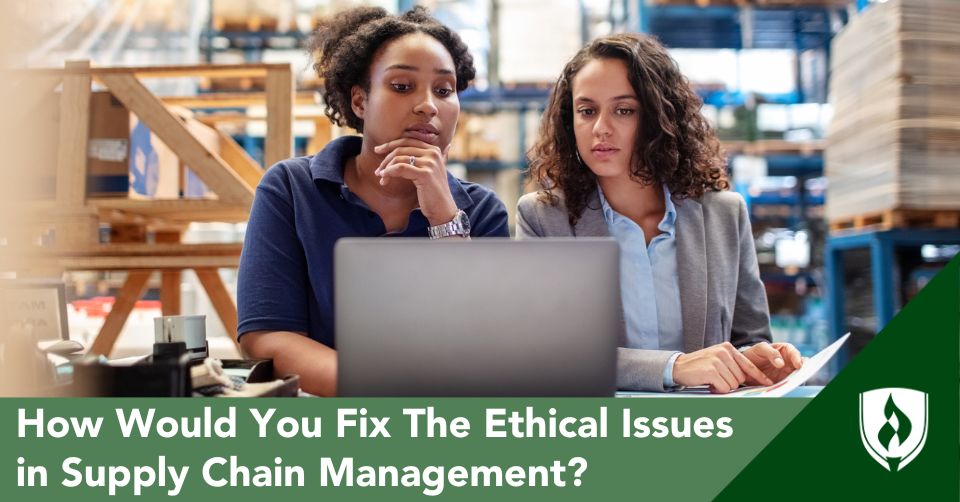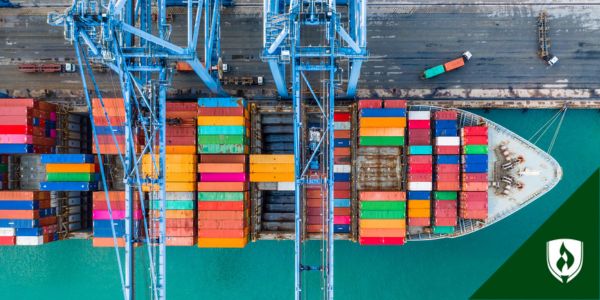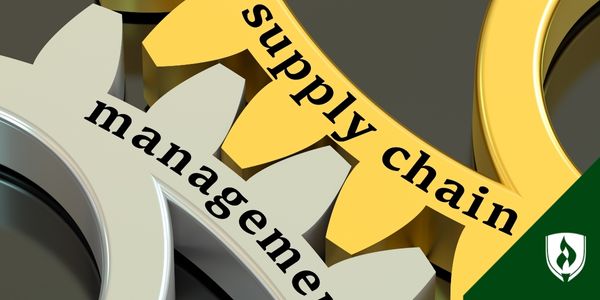
You're familiar with supply chain management. Maybe you work in a warehouse, or maybe you work for a supplier. Or maybe you are just starting to learn about this often-overlooked industry. Supply chains are complicated, and consequently, they touch many different areas of impact in the world.
Building an ethical supply chain is far easier said than done.
If you’ve ever spent some time in a warehouse, in shipping or in inventory, you might have noticed a bunch of things about the industry that seem wrong. The common thread between them all? They're all legal.
Ethical practices are often not mandated by law. And in the sprawling supply chains of the world, this is especially true.
You know these problems have existed for a while, and you know they'll probably take some time to resolve, but you still hate seeing injustice or practices that are just plain bad. If you want to hold the supply chain industry to a higher standard, read on.
Here's an introduction to supply chain ethics, and a breakdown of some of the biggest ethical issues facing the industry—from what they mean, to why they matter.
Why are supply chain ethics important?
Just like in any industry, ethical considerations are essential.
When organizations engage in unethical practices—negatively affecting individuals, communities and the planet—it impacts people's lives. And in today's highly-connected world, strong ethical conduct isn't just a moral imperative, it's a strategic one. The exposure of unethical behavior can have severe consequences on a company's reputation.
Supply chain ethics often impact many different companies, and are also the responsibility of many different leaders. When people in leadership positions commit to implementing ethical practices and systems across their supply chain, it can make a big difference on many organizations’ impact. Doing that starts with knowing what exactly these issues are.
What are some of the biggest ethical issues in supply chains?
It probably goes without saying, but the ethical issues facing today's supply chains can't all be summarized in one quick article. They cross international borders, exist within a world of legal jargon and are blurred by a historical lack of visibility and transparency.
But it’s important to know—ethical practices are possible. And pushing toward ethical supply chains all around the globe is an important step in the sustainability of industry.
There are a few big, overarching issues and ethical questions at the forefront of the field, and if you work in the supply chain, you may have noticed. Here are four major ethical issues found in supply chain management and today's supply chain processes.
1. Human rights
Forced labor, child labor, human trafficking, modern slavery. You've probably heard all of these terms, and though they might not apply to the specific environment you work in, they make up a lot of the long-standing and emerging issues in the greater supply chain industry. All of these problems fall under one big umbrella: Human rights.
It's well-documented that even some of the most well-known firms' lower-tier suppliers lack protocols for identifying and handling human rights violations.1 From issues of sexual harassment to retaliation by supervisors to issues of overworking and chronic overtime, promoting more ethical supply chain practices means putting procedures in place to address these issues at all of an organization's supply chain partners.1
Ethical supply chain management means proactive measures to protect human rights, all the way across the chain.
2. Labor conditions
While this one technically falls under the above umbrella, it's also a major issue on its own. Unsafe working conditions, hazardous working environments and unreasonable working hours all contribute to unethical labor conditions.
Just a few years ago, reporters at Harvard Business Review (HBR) studied seven lower-tier suppliers in the United States and found that three had high concentrations of airborne chemicals and a lack of systematic accident reporting.1 And that's just one small, specific example of the greater issue.
Ethical supply chain management means upholding fair labor practices and looking beyond existing labor laws to see where labor conditions can be improved to keep more people safe.
In a world where efficiency is everything, improving labor conditions may mean turning to new methods like supply chain mapping and artificial intelligence to streamline production and keep up with consumer demand.
To see what some of these methods are, check out Supply Chain Optimization: 7 Ways Businesses Are Improving Efficiency.
3. Fair pay
Fair wages and fair trade practices are another big topic of conversation in the supply chain management world. In the United States, the federal minimum wage is $7.25 per hour, according to the U.S. Department of Labor.2 In many other countries around the world, it's much lower—and the U.S.'s overseas workers don't need to be paid according to America's regulations.
This discrepancy can translate into significant cost savings, creating an incentive for American organizations to employ overseas workers and pay them far less than they'd need to pay any workers here. This is often legal, but it’s unethical to pay workers less than a livable wage.
Fair trade practices, whether organized through a certifying body or just carefully monitored by a corporation are one way of trying to address this issue.
For ethical supply chains, this can lead to a gray area of questions around what counts as labor exploitation, and many people see this as a big question mark in the greater supply chain industry.
4. Environmental impact
In today's climate crisis, tons of industries are tackling issues of environmental sustainability. They're weighing their environmental responsibility and trying to find ways to meet changing environmental regulations and reduce things like their carbon emissions and carbon footprints. But the supply chain management industry has a particularly long way to go with this.
The typical consumer company's supply chain creates far greater social and environmental costs than its own operations, accounting for more than 80% of greenhouse-gas emissions and more than 90% of the impact on air, land, water, biodiversity and geological resources, according to a well-known McKinsey study.3
Even many of America's most exemplary, model firms' lower-tier suppliers have marginal or completely lack environmental management systems, according to an HBR report.1 And these are firms that are actively, publicly encouraging sustainability. If leading corporations are struggling to enforce sustainability practices across their supply chains, then all signs point to average company's suppliers struggling even more.
Ethical supply chain management practices will monitor environmental impact and push the industry toward more sustainability. That’s an ethical concern as well as a pragmatic one.
How can I contribute to a more ethical supply chain?
From human rights and environmental issues to questions of corporate social responsibility, addressing and improving unethical supply chain operations starts with the supply chain professionals on the ground.
Leaders who work in the supply chain with an insistence on acting ethically can make a huge difference in the world. They call attention to these problems and help introduce protocols to address them. And you could be one of these leaders.
If you have any warehouse experience, put it to use in a higher-level supply chain management career, and make a positive difference in the industry you care about. That all starts with continuing your education and pursuing a supply chain management degree.
Not sure it's the right path for you? Learn more by reading our article, "What Can You Do With a Supply Chain Management Degree? 8 Careers to Consider."
1Veronica H. Villena and Dennis A. Gioia, , A More Sustainable Supply Chain, (March-April 2020), A More Sustainable Supply Chain (hbr.org)
2U.S. Department of Labor, Minimum Wage, [Accessed October 2024] https://www.dol.gov/general/topic/wages/minimumwage#:~:text=The%20federal%20minimum%20wage%20for,of%20the%20two%20minimum%20wages.
3Anne-Titia Bove and Steven Swartz, Starting at the source: Sustainability in supply chains, (Nov.11, 2016), Starting at the source: Sustainability in supply chains | McKinsey




